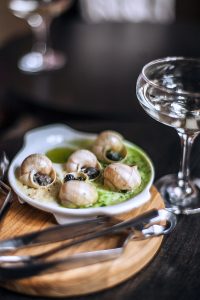Are you intrigued by the elegance and sophistication of fine dining establishments? Are you passionate about providing exceptional service and creating memorable experiences for diners? If so, then embarking on a career as a fine dining server may be the perfect choice for you. In this comprehensive guide, we will delve into the intricacies of fine dining service, exploring the essential skills, etiquette, and strategies that will set you on the path to becoming an outstanding fine dining server. So put on your apron, polish your silverware, and uncover the secrets to excelling in fine dining service. Let’s explore!
What Does It Mean to Be a Fine Dining Server?
Being a fine dining server is more than simply taking orders and serving food. It is an art form that requires a combination of technical skills, knowledge, and impeccable etiquette. As a fine dining server, you are entrusted with creating an unforgettable dining experience for guests through personalized service, attention to detail, and a deep understanding of the culinary world. Let’s explore how you can embrace the role of a fine dining server and deliver excellence with every interaction.
How to Be a Fine Dining Server

Step 1: Embrace a Customer-Centric Mindset
A commitment to exceeding customer expectations is at the core of fine dining service. Adopting a customer-centric mindset means placing the needs and desires of the guest above all else. From the moment they step through the door until they leave, your focus should be creating a seamless, enjoyable experience for every guest.
Step 2: Hone Your Knowledge of Food and Wine
To provide exceptional service in a fine dining establishment, it is crucial to possess a comprehensive knowledge of food and wine. Familiarize yourself with the menu, including ingredients, cooking techniques, and flavor profiles. Additionally, develop a solid understanding of various wine varieties, their characteristics, and how they pair with different dishes. Regularly educate yourself on culinary trends and wine advancements to stay relevant and informed.
Step 3: Perfect the Art of Timing
Timing is of the essence in the world of fine dining. Learn to synchronize your service with the kitchen, ensuring that dishes are delivered promptly and at the right temperature. Coordinate with your team to orchestrate a flawless dining experience where courses flow seamlessly and guests never feel rushed or neglected.
Step 4: Develop Exceptional Communication Skills
Effective communication is paramount to providing outstanding service. You will interact with guests, colleagues, and chefs daily as a fine dining server. Refine your verbal and non-verbal communication skills, focusing on clarity, empathy, and professionalism. Be attentive and responsive to guest needs and communicate their preferences accurately to the kitchen and sommeliers.
Step 5: Embody Elegance and Professionalism
Fine dining service demands a high level of elegance and professionalism. Pay attention to your personal grooming, ensuring that your appearance reflects the sophistication of the establishment. Maintain a calm and composed demeanor, even in challenging situations. Your posture, gestures, and overall presentation should exude confidence and poise.
Mastering Fine Dining Etiquette

Greeting and Seating Guests
The first impression sets the tone for the entire dining experience. When welcoming guests, greet them with a warm smile and address them respectfully. Escort them to their table, helping with seating and ensuring their comfort. Familiarize yourself with seating protocols and the correct way to handle seating arrangements for different group sizes.
Understanding Table Settings
A well-set table is a work of art, and as a fine dining server, you must understand the intricacies of table settings. Familiarize yourself with the various glassware, silverware, and China used in fine dining establishments. Master the art of folding napkins in elegant and creative ways. Ensure that tables are impeccably set before guests arrive, paying attention to the smallest details.
Taking Orders with Finesse
Taking orders is a delicate process that requires finesse and precision. Approach the task confidently, attentively, and genuinely interested in meeting the guest’s preferences. Memorize the menu to ensure smooth and efficient ordering. If guests require guidance, they offer well-informed suggestions based on their tastes and dietary restrictions. Use active listening skills to capture all the necessary details accurately.
Navigating Wine Service
Wine is an integral part of the fine dining experience, and as a server, you must confidently navigate wine service. Familiarize yourself with different wine regions, varietals, and vintages. Understand the proper way to present, open, and pour wine. Offer recommendations that complement the guest’s meal choices. If a guest requests assistance selecting a wine, ask thoughtful questions to understand their preferences and guide them accordingly.
Exceeding Customer Expectations
To truly excel as a fine dining server, it is essential to go above and beyond in exceeding customer expectations. Anticipating needs, personalizing the dining experience, suggesting menu enhancements, and gracefully handling difficult situations are all key strategies to create unforgettable dining moments.
Anticipating Needs
Great service involves anticipating and fulfilling guests’ needs before they are even expressed. Pay attention to subtle cues and proactively offer solutions or assistance. Ensure that water glasses are always filled, bread baskets are replenished, and guests have everything they require for a comfortable and enjoyable dining experience.
Providing Special Dietary Accommodations
In today’s diverse culinary landscape, preparing to accommodate special dietary needs is crucial. Familiarize yourself with common dietary restrictions and allergens. Communicate effectively with guests to understand their requirements and offer suitable alternatives or modifications. Collaborate with the kitchen to ensure special dietary accommodations are prepared and served correctly.
Personalizing the Dining Experience
Creating a personalized experience for each guest adds an extra touch of luxury to fine dining service. Take note of guest preferences, such as preferred seating, favorite dishes, or wine styles. Surprise and delight them by remembering these details and incorporating them into their dining experience whenever possible. Personalization creates a lasting impression and a strong connection between the guest and the establishment.
Suggesting Menu Enhancements
As a fine dining server, you have the opportunity to elevate the dining experience by suggesting menu enhancements. Familiarize yourself with the menu offerings, including daily specials and seasonal ingredients. Be knowledgeable about flavor profiles and pairings, enabling you to recommend menu additions or modifications that enhance the guest’s meal. Offer thoughtful suggestions for appetizers, side dishes, or desserts that complement their chosen entrée.
Polishing Your Service Skills
To be a fine dining server, continuous improvement and refinement of your service skills are essential. Let’s explore some areas where you can focus on enhancing service delivery.
Perfecting Tableside Preparations
Tableside preparations add an element of theatre to fine dining and require precision and skill. Familiarize yourself with classic tableside preparations such as Caesar salad, flambé dishes, or carving meats. Practice these techniques to ensure a seamless and captivating experience for the guests. Engage in conversation with guests while performing tableside preparations, offering insights into the dish and creating a memorable dining moment.
Mastering the Art of Plate Presentation
Plate presentation is an art form that transforms a meal into a visual masterpiece. Work closely with the kitchen team to understand their plating techniques and principles. Pay attention to details such as garnishing, sauce drizzles, and the arrangement of components on the plate. Strive for consistency and precision in presenting dishes, ensuring that each plate is a feast for the eyes.
Effective Communication and Active Listening
Communication is the backbone of exceptional service. Practice active listening to ensure that you fully understand guest requests and preferences. Maintain clear and concise communication with the kitchen and other staff to ensure seamless coordination. Adapt your communication style to match the needs and preferences of each guest, whether they prefer a formal or more relaxed interaction.
Maintaining Poise and Professionalism
Fine dining service can be demanding and fast-paced, but it is crucial always to maintain poise and professionalism. Project an air of calm and composure even during busy periods or challenging situations. Avoid getting flustered or showing signs of stress, as it can impact the guest’s perception of the overall dining experience. Remember that your professionalism sets the tone for the entire establishment.
The Fine Art of Wine Pairing
Wine is an integral part of the fine dining experience, and as a server, you can enhance the dining experience through wine pairing. To effectively assist guests in their wine selection, it is essential to have a solid understanding of wine basics. Familiarize yourself with wine regions, grape varietals, and their characteristics. Learn to identify common tasting notes and understand the different styles of wine, such as sparkling, white, red, and dessert wines. Stay updated with emerging trends and new releases in the wine industry.
When a guest seeks your guidance in selecting a wine, listen attentively to their preferences and gather information about their meal choices. Ask questions to understand their desired flavor profile, intensity, and any specific preferences they may have. Offer recommendations that align with their preferences and suggest suitable wine pairings based on the flavors and characteristics of their chosen dishes. Present wine options confidently, providing background information and tasting notes to assist the guest in making an informed decision.
Pairing wine with food is an art that can elevate the flavors and enhance the overall dining experience. Understand the basic principles of wine and food pairing, such as matching intensities, complementing flavors, and considering the richness or acidity of the dish. Develop a repertoire of classic wine and food pairings, experimenting with unconventional combinations to surprise and delight guests. Remember that no hard and fast rules and personal preferences should always be considered.
Conclusion
Becoming a fine dining server is an exciting journey that requires a blend of technical expertise, refined communication skills, and a passion for delivering exceptional service. You can excel in this role by embracing a customer-centric mindset, honing your knowledge of food and wine, perfecting your timing, and developing exceptional communication skills. Additionally, by mastering fine dining etiquette, exceeding customer expectations, and continuously polishing your service skills, you can create unforgettable dining experiences for guests. Remember, being a fine dining server is a job and an opportunity to create lasting memories and provide unparalleled hospitality. So, embrace the art of fine dining service, and let your passion for excellence shine through in every interaction.
 FAQs
FAQs
Q1: What qualifications do I need to become a fine dining server?
To become a fine dining server, formal qualifications are not always mandatory. However, most establishments prefer candidates with a high school diploma or equivalent. Having prior experience in the hospitality industry is beneficial, particularly in upscale dining establishments. Strong communication skills, a good memory, and a passion for exceptional service are highly valued attributes in the field.
Q2: Is having extensive knowledge about wine necessary to be a fine dining server?
While having extensive wine knowledge is advantageous, being a fine dining server is not an absolute requirement. However, a basic understanding of wine varieties and regions and the ability to make suitable recommendations can greatly enhance the guest experience. It is always beneficial to continue learning and expanding your knowledge of wine to provide more informed service.
Q3: What should I do if a guest has a food allergy?
Food allergies are a serious concern in the mining industry, and as a fine dining server, it is crucial to handle them with care. When a guest informs you of a food allergy, listen attentively and take their concerns seriously. Communicate their allergies to the kitchen staff to ensure their meal is prepared safely, avoiding cross-contamination. Offer alternative options or modifications to accommodate their dietary needs and reassure them that their allergies will be considered during the dining experience.
Q4: How do I handle a situation when a guest is dissatisfied with their meal?
Handling a dissatisfied guest requires empathy, active listening, and swift action. If a guest expresses dissatisfaction with their meal, listen attentively to their concerns without interrupting. Apologize sincerely and offer solutions to rectify the situation, such as replacing the dish or offering an alternative. Communicate their concerns to the kitchen and work together to find a suitable resolution. Ensure that the guest feels heard and valued and that their dissatisfaction is addressed promptly.
Q5: Is it important to memorize the entire menu?
Memorizing the entire menu is highly beneficial as a fine dining server. It allows you to provide efficient and accurate recommendations to guests, answer their questions about ingredients or preparation methods, and make informed suggestions based on their preferences. However, if the menu is extensive, memorizing every detail may not be feasible. In such cases, focus on familiarizing yourself with the key dishes, signature items, and daily specials.

